Serving 533 students in grades 4-5, Frank P Long Intermediate School ranks in the bottom 50% of all schools in New York for overall test scores (math proficiency is bottom 50%, and reading proficiency is bottom 50%).
The percentage of students achieving proficiency in math is 23% (which is lower than the New York state average of 46%). The percentage of students achieving proficiency in reading/language arts is 19% (which is lower than the New York state average of 49%).
The student:teacher ratio of 11:1 is equal to the New York state level of 11:1.
Minority enrollment is 71% of the student body (majority Hispanic), which is higher than the New York state average of 60% (majority Hispanic).
Quick Stats (2025)
- Grades: 4-5
- Enrollment: 533 students
- Student:Teacher Ratio: 11:1
- Minority Enrollment: 71%
- Overall Testing Rank: Bottom 50% in NY
- Math Proficiency: 23% (Btm 50%)
- Reading Proficiency: 19% (Btm 50%)
- Science Proficiency: 62% (Btm 50%)
- Source: National Center for Education Statistics (NCES), NY Dept. of Education
Top Rankings
Frank P Long Intermediate School ranks among the top 20% of public schools in New York for:
Category
Attribute
Diversity
School Overview
Frank P Long Intermediate School's student population of 533 students has declined by 12% over five school years.
The teacher population of 50 teachers has declined by 12% over five school years.
Grades Offered
Grades 4-5
(offers virtual instruction)
(offers virtual instruction)
Total Students
533 students
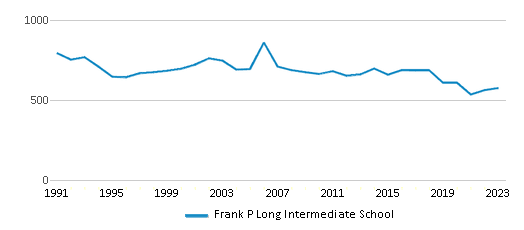
Gender %
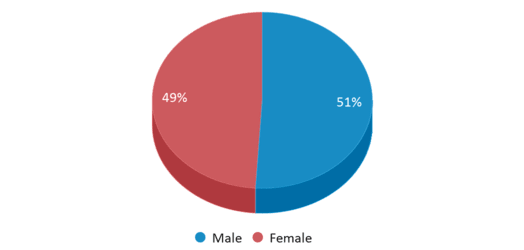
Total Classroom Teachers
50 teachers
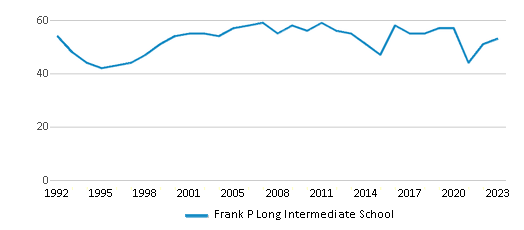
Students by Grade
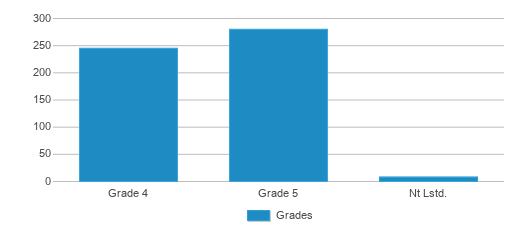
School Rankings
Frank P Long Intermediate School ranks within the bottom 50% of all 4,377 schools in New York (based off of combined math and reading proficiency testing data).
The diversity score of Frank P Long Intermediate School is 0.68, which is less than the diversity score at state average of 0.72. The school's diversity has stayed relatively flat over five school years.
Overall Testing Rank
#3941 out of 4377 schools
(Bottom 50%)
(Bottom 50%)
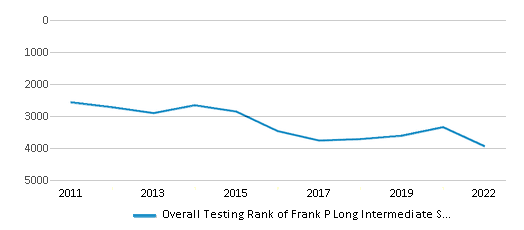
Math Test Scores (% Proficient)
23%
46%
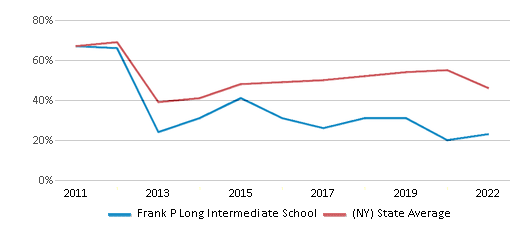
Reading/Language Arts Test Scores (% Proficient)
19%
49%
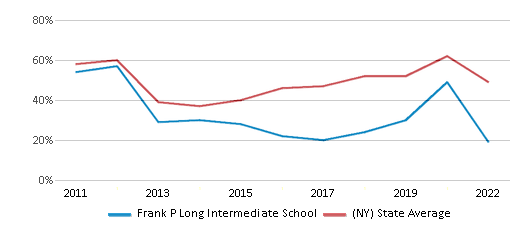
Science Test Scores (% Proficient)
62%
78%
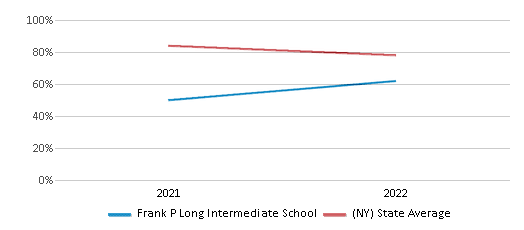
Student : Teacher Ratio
11:1
11:1
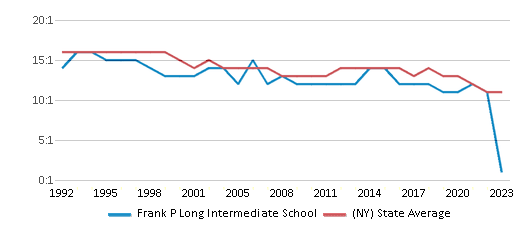
American Indian
n/a
1%
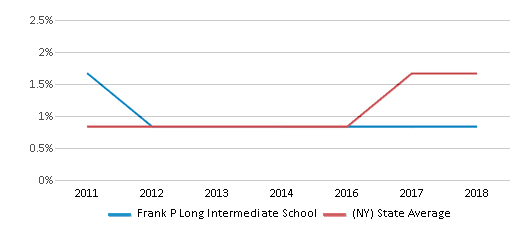
Asian
2%
10%
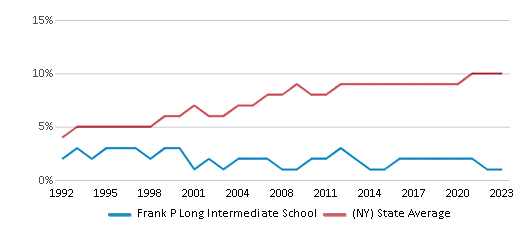
Hispanic
46%
30%
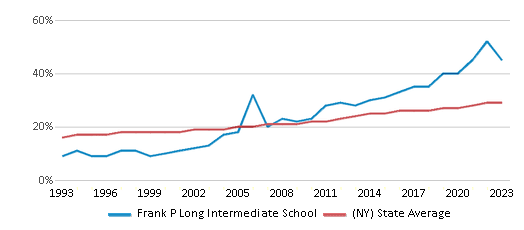
Black
17%
16%
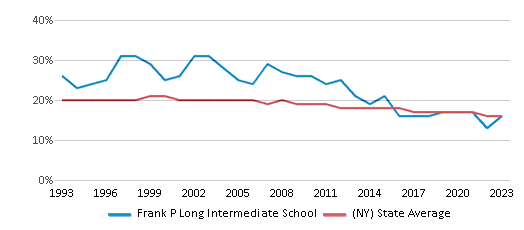
White
29%
40%
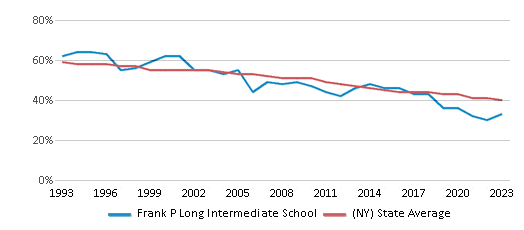
Hawaiian
n/a
n/a
Two or more races
6%
3%
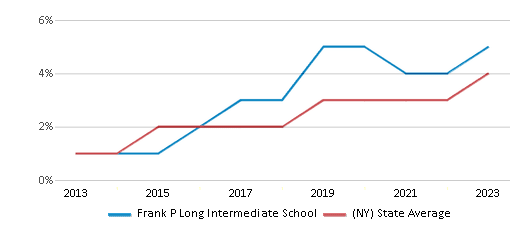
All Ethnic Groups
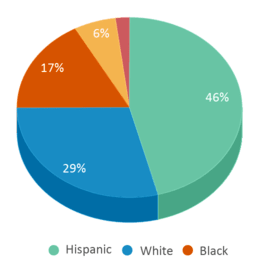
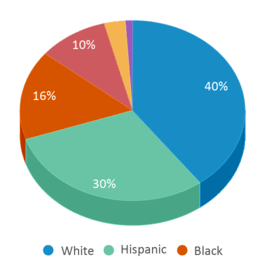
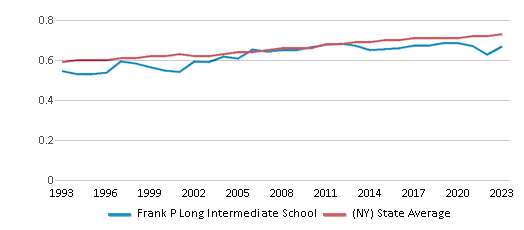
Participates in the National School Lunch Program (NSLP)
Yes
Eligible for Free Lunch
55%
54%
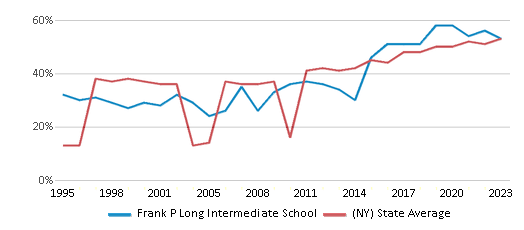
Eligible for Reduced Lunch
3%
3%
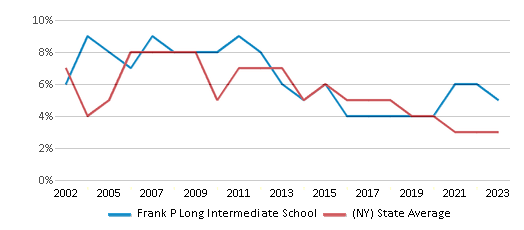
School Statewide Testing
School District Name
Source: National Center for Education Statistics (NCES), NY Dept. of Education
Profile last updated: 02/09/2025
Frequently Asked Questions
What is Frank P Long Intermediate School's ranking?
Frank P Long Intermediate School is ranked #3941 out of 4,377 schools, which ranks it among the bottom 50% of public schools in New York.
What percent of students have achieved state testing proficiency in math and reading?
23% of students have achieved math proficiency (compared to the 46% NY state average), while 19% of students have achieved reading proficiency (compared to the 49% NY state average).
How many students attend Frank P Long Intermediate School?
533 students attend Frank P Long Intermediate School.
What is the racial composition of the student body?
46% of Frank P Long Intermediate School students are Hispanic, 29% of students are White, 17% of students are Black, 6% of students are Two or more races, and 2% of students are Asian.
What is the student:teacher ratio of Frank P Long Intermediate School?
Frank P Long Intermediate School has a student ration of 11:1, which is equal to the New York state average of 11:1.
What grades does Frank P Long Intermediate School offer ?
Frank P Long Intermediate School offers enrollment in grades 4-5 (offers virtual instruction).
What school district is Frank P Long Intermediate School part of?
Frank P Long Intermediate School is part of South Country Central School District.
School Reviews
5 9/24/2016
The school is a good school my daughter loved her time and the teachers work with those who seek it. Parent University offered at the school helped to better help my child. They are not the top school but they work hard for our kids. My daughter enjoyed the ballroom dancing as did many of her friends. I am now after five years out of the district but Kreamer and FPL were good experiences for my child and they deserve acknowledgement for what they do to give our kids a good foundation and caring for them as they grow.
2 12/7/2015
Terrible school. Genius' don't have anything to do and are BORED. There are a couple of nice teachers. Kids have to play with building blocks when it rains. There is barely any balls outside. They reward kids who play soccer with lollipops and ice pops while kids who don't play soccer and kickball just watch. Kids are forced to ballroom dance. And are supposed to not be reluctant and be like awesome at it. Then when that's all over, when they get to go to gym and music again, they get to square dance! This is a terrible school
Review Frank P Long Intermediate School. Reviews should be a few sentences in length. Please include any comments on:
- Quality of academic programs, teachers, and facilities
- Availability of music, art, sports and other extracurricular activities
Recent Articles

What Is A Charter School?
Explore the world of charter schools in this comprehensive guide. Learn about their history, how they operate, and the pros and cons of this educational innovation. Discover key facts about charter schools, including admission policies, demographics, and funding, as well as what to look for when considering a charter school for your child.

10 Reasons Why High School Sports Benefit Students
Discover the 10 compelling reasons why high school sports are beneficial for students. This comprehensive article explores how athletics enhance academic performance, foster personal growth, and develop crucial life skills. From improved fitness and time management to leadership development and community representation, learn why participating in high school sports can be a game-changer for students' overall success and well-being.

February 05, 2025
Understanding the U.S. Department of Education: Structure, Impact, and EvolutionWe explore how the Department of Education shapes American education, from its cabinet-level leadership to its impact on millions of students, written for general audiences seeking clarity on this vital institution.





